|
|
|
Sort Order |
|
|
|
Items / Page
|
|
|
|
|
|
|
| Srl | Item |
| 1 |
ID:
152428
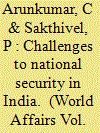

|
|
|
|
|
| Summary/Abstract |
There are numerous challenges to the national security of India and the extent and scope of threats are complex, varied and vast. C Arunkumar and P Sakthivel argue that if appropriate actions are not taken, the threats may result in the gradual degradation of the Indian state. They suggest a new set of policies and mechanisms in diverse arenas.
|
|
|
|
|
|
|
|
|
|
|
|
|
|
|
|
| 2 |
ID:
151890
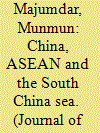

|
|
|
| 3 |
ID:
140885
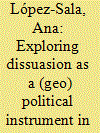

|
|
|
|
|
| Summary/Abstract |
This article analyses the evolution and implementation of Spanish policy to control irregular immigration via maritime routes over the past two decades. Starting from the premise that this policy was based on a comprehensive strategy of dissuasion to prevent, contain and hinder the arrival and settlement of irregular immigrants, for analytical purposes the article introduces the concepts of preventive dissuasion, coercive dissuasion and repressive dissuasion to describe actions of diverse categories, hierarchy and scope that sequentially and simultaneously shape and structure the logic behind dissuasion used in different “territorial settings”. Spain has deployed a great deal of this policy – mainly preventive and coercive dissuasion strategies – through bilateral agreements and formal practices with African countries. This article is based on fieldwork carried out between 2008 and 2012 in different Spanish border areas, including interviews with different actors and visits to border posts and surveillance installations.
|
|
|
|
|
|
|
|
|
|
|
|
|
|
|
|
| 4 |
ID:
110166
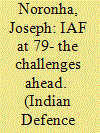

|
|
|
| 5 |
ID:
121441
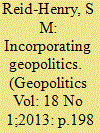

|
|
|
|
|
| Publication |
2013.
|
| Summary/Abstract |
This paper develops a critique of the emergence of the new European Border Agency, Frontex, specifically its operations along Europe's maritime borders with North Africa. Rather than account for Frontex in terms of securitising and neoliberalising processes, as has become common, I focus instead on the underlying geopolitical rationalities that guide Frontex operations. These reflections then set up the further argument of the paper: that what Frontex itself sheds light upon is a novel geopolitics of the border, what can be thought of as an 'incorporating geopolitics'. Through investigation of the policies and practices of Frontex, such an incorporating geopolitics can be shown to be replacing the much-discussed paradox of contemporary border regimes - that between trade freedoms and security restrictions - with a more fundamental contradiction: that the more border controls address more than just borders, the more they may themselves undermine the societies they purport to protect.
|
|
|
|
|
|
|
|
|
|
|
|
|
|
|
|
| 6 |
ID:
133521


|
|
|
|
|
| Publication |
2014.
|
| Summary/Abstract |
Bangladesh and Myanmar share both land and maritime borders, and have age-old commercial and cultural ties. These two close neighbours have unlimited potentials in mutual cooperation in trade, connectivity and people to people contact. Both geostrategic and geoeconomic viewpoints justify the necessity of strong Bangladesh-Myanmar relations. Nevertheless, they have failed to best utilise their proximity and historical ties for economic and strategic gains. Since the establishment of the diplomatic tie in 1972, the relations have not always been smooth due to lack of political will especially from the Myanmar government, mutual misperceptions and suspicions. The Rohingya refugee issue, tensions in border and transnational crimes have been the key impediments to a meaningful bilateral relation. As consequences, many vital bilateral agreements and MoUs are pending. It is a reality that friends or allies may be changed but not neighbours. Therefore, the best interests of these close neighbours lie in exploring potential areas of cooperation and prosper together. This paper identifies several potential areas of mutual cooperation to explore and argues that for attaining a new height in Bangladesh-Myanmar relations, failure in resolving any hard issue such as the refugee issue should not be allowed to leave any negative impact on other prospective areas. Exploring the potential areas and trying to resolve the key disputes through various channels can be done simultaneously. For greater friendship, removing suspicions and opening up minds are imperative for these neighbours.
|
|
|
|
|
|
|
|
|
|
|
|
|
|
|
|
| 7 |
ID:
133519


|
|
|
|
|
| Summary/Abstract |
Bangladesh and Myanmar share both land and maritime borders, and have age-old commercial and cultural ties. These two close neighbours have unlimited potentials in mutual cooperation in trade, connectivity and people to people contact. Both geostrategic and geoeconomic viewpoints justify the necessity of strong Bangladesh-Myanmar relations. Nevertheless, they have failed to best utilise their proximity and historical ties for economic and strategic gains. Since the establishment of the diplomatic tie in 1972, the relations have not always been smooth due to lack of political will especially from the Myanmar government, mutual misperceptions and suspicions. The Rohingya refugee issue, tensions in border and transnational crimes have been the key impediments to a meaningful bilateral relation. As consequences, many vital bilateral agreements and MoUs are pending. It is a reality that friends or allies may be changed but not neighbours. Therefore, the best interests of these close neighbours lie in exploring potential areas of cooperation and prosper together. This paper identifies several potential areas of mutual cooperation to explore and argues that for attaining a new height in Bangladesh-Myanmar relations, failure in resolving any hard issue such as the refugee issue should not be allowed to leave any negative impact on other prospective areas. Exploring the potential areas and trying to resolve the key disputes through various channels can be done simultaneously. For greater friendship, removing suspicions and opening up minds are imperative for these neighbours.
|
|
|
|
|
|
|
|
|
|
|
|
|
|
|
|
| 8 |
ID:
133520


|
|
|
|
|
| Summary/Abstract |
Bangladesh and Myanmar share both land and maritime borders, and have age-old commercial and cultural ties. These two close neighbours have unlimited potentials in mutual cooperation in trade, connectivity and people to people contact. Both geostrategic and geoeconomic viewpoints justify the necessity of strong Bangladesh-Myanmar relations. Nevertheless, they have failed to best utilise their proximity and historical ties for economic and strategic gains. Since the establishment of the diplomatic tie in 1972, the relations have not always been smooth due to lack of political will especially from the Myanmar government, mutual misperceptions and suspicions. The Rohingya refugee issue, tensions in border and transnational crimes have been the key impediments to a meaningful bilateral relation. As consequences, many vital bilateral agreements and MoUs are pending. It is a reality that friends or allies may be changed but not neighbours. Therefore, the best interests of these close neighbours lie in exploring potential areas of cooperation and prosper together. This paper identifies several potential areas of mutual cooperation to explore and argues that for attaining a new height in Bangladesh-Myanmar relations, failure in resolving any hard issue such as the refugee issue should not be allowed to leave any negative impact on other prospective areas. Exploring the potential areas and trying to resolve the key disputes through various channels can be done simultaneously. For greater friendship, removing suspicions and opening up minds are imperative for these neighbours.
|
|
|
|
|
|
|
|
|
|
|
|
|
|
|
|
| 9 |
ID:
146216


|
|
|
|
|
| Edition |
Enlarged 2nd ed.
|
| Publication |
New Delhi, Pentagon Press, 2016.
|
| Description |
xxv, 166p.hbk
|
| Standard Number |
9788182748620
|
|
|
|
|
|
|
|
|
|
|
|
Copies: C:1/I:0,R:0,Q:0
Circulation
| Accession# | Call# | Current Location | Status | Policy | Location |
| 058736 | 355.033054/DAS 058736 | Main | On Shelf | General | |
|
|
|
|
| 10 |
ID:
115955
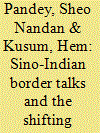

|
|
|
|
|
|
|
|